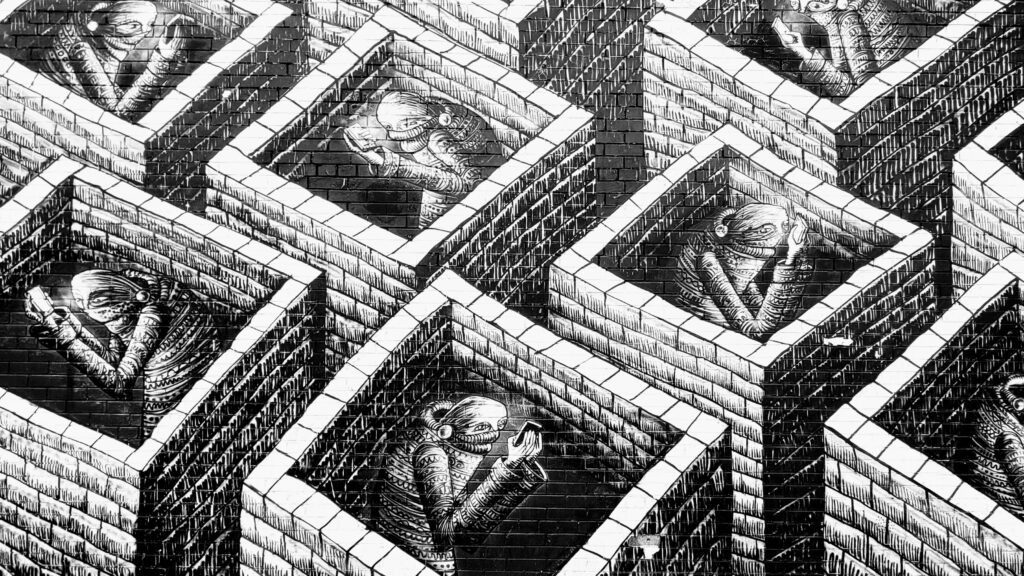Papers, Please? The Republican Plan to Wall Off the Internet
Anna Bonesteel / Nov 1, 2024Anna Bonesteel is an artist, researcher, and Senior Writer at Fight for the Future.

Mural in Brooklyn, New York. 2021.
During the Biden presidency, 11 US states passed laws that aim to restrict people under 18 from accessing certain websites. These online ID check laws force websites that host a certain amount of “adult content” to verify their users’ ages, either via a government ID or through a third-party service. Across these 11 states, an estimated 55 million Internet users encounter government checkpoints when they use the Internet.
The official pretext for ID check laws is the so-called “pornography epidemic,” a moral panic that right-wing reactionaries blame for everything from falling birth rates to youth depression. But as the election nears, it is essential to understand that age-gating laws are about much more than restricting pornography. By advancing state-level and national Internet use restrictions, Republican lawmakers are using the infrastructural power of the Internet to build a surveillance and censorship machine.
Porn is a notoriously ambiguous category, and this is the key to the right’s ID-checking campaign. If, like former Supreme Court Justice Potter Stewart, ‘you know it when you see it,’ people like Republican Vice Presidential candidate Sen. JD Vance (R-OH) and Heritage Foundation president Kevin Roberts ‘know it’ quite often: they ‘know it’ when sex educators share information about birth control options, when they flip past Drag Race on Hulu, and when the public library hosts an LGBTQ+ reading group. Republicans are not even trying to hide this: Kansas’s law explicitly defines “acts of homosexuality” as adult content.
To Vance, Roberts, and others on the right, anything that threatens the existing patriarchal order is pornography, and ‘pornographers’ must face consequences. The introduction to Project 2025, again, says the quiet part loud: in it, Roberts demands that porn producers and distributors be imprisoned and that the tech companies that host it be shut down.
Right now, these age-gating laws are unevenly distributed. But if the states are the ‘laboratories of democracy,’ they might also be the laboratories of fascism. If Republicans take the presidency and the Senate, restrictive online ID checks—and punishments for evading them—could become the new normal.
ID check laws come with technical dangers: no one has created a completely protected method for collecting this sensitive information. Hacks and data breaches are already exposing personal information and browsing history. Pornhub, the white whale for lawmakers in Texas and elsewhere, has argued that secure site-level age verification can’t be done at all. In response to age-gating laws, they have blocked entire states from using their websites, saying they would rather lose business than engage in age surveillance that is expensive and insecure.
These dangers should be reason enough to reject online ID checks. But I would argue that the age-gating craze must first be understood as an infrastructural censorship gambit. Conservatives don’t see the Internet as a place for information sharing—they see it as a tool for near-universal information control. By demanding website-level age verification, the “series of tubes” becomes a series of walls.
Add to this a dangerous chilling effect. When a pop-up arrives demanding a driver’s license or a passport, people are likely to just click away. “Adult content” labels will likely deter creation and sharing—from teens drawing fan art to support groups creating educational resources, and yes, to pornographers filming erotica. Republicans’ rush to install online ID checks isn’t a good-faith attempt to protect kids from digital danger. It’s an attempt by a conservative minority to restrict the legal bounds of creation, consumption, and communication.
I work for Fight for the Future, a national digital rights group. For the past two years, we and our many allies have been fighting against the Kids’ Online Safety Act (KOSA), a bill that similarly masks censorship with “protect the kids” messaging. Lawmakers working in good faith, including many Democrats, think KOSA is the most expedient way to fight Big Tech. Lawmakers working in bad faith know that KOSA will have their desired effect of childproofing the web.
Fifty-four online ID check bills were introduced this year alone. We desperately need lawmakers to see these bills for what they really are: a right-wing information power grab. If we grant this power to a party that is home to racists, bigots, and aspiring dictators, it will be difficult to reverse course.
Authors
